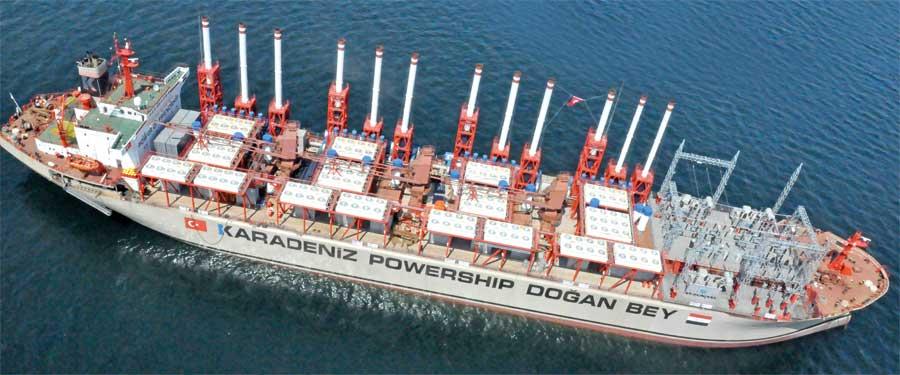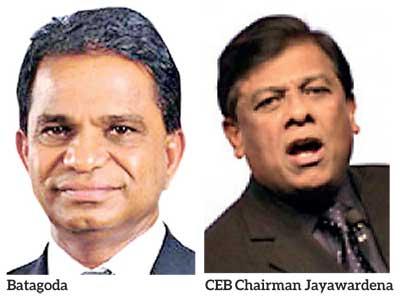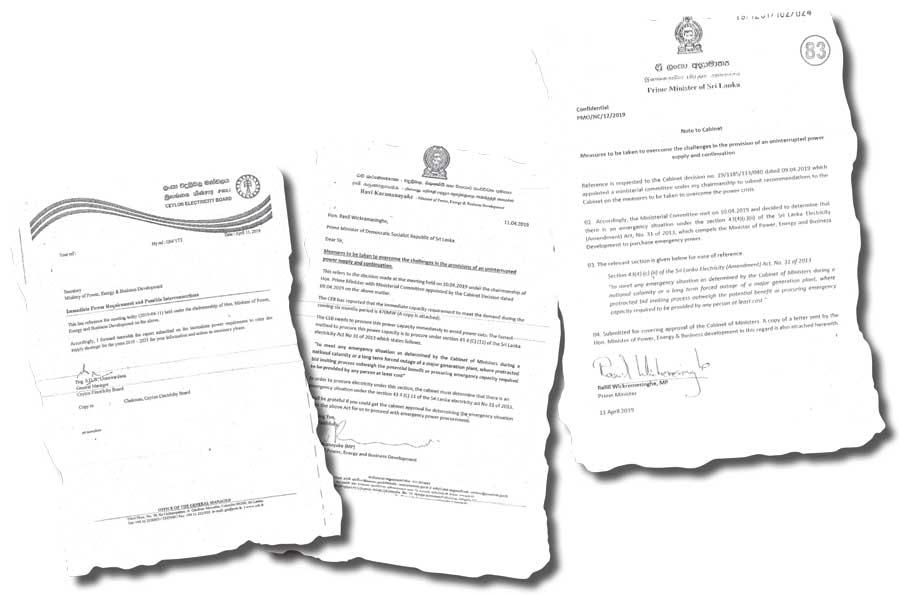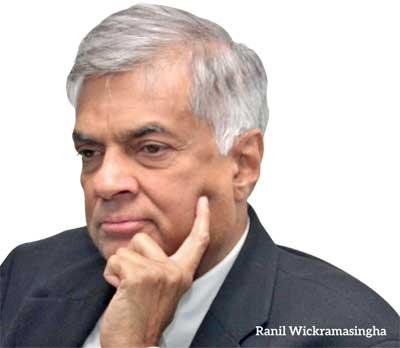Deals and deals: behind procuring emergency power
Posted on June 16th, 2019
Courtesy The Daily Mirror

Eyebrows have been raised as to why the five-member Ministerial Committee headed by Prime Minister Ranil Wickremasinghe, that was appointed by the Cabinet of Ministers to propose urgent remedial measure to avoid power cuts, took a decision on April 10, 2019 to announce an emergency situation in the country and gave permission to the Ceylon Electricity Board to procure emergency power, when the country was not facing an emergency situation.
- All three bidders agreed to provide supplementary power at their selected sites for six months
- This Ministry will take action to obtain covering approval of the cabinet to award the contracts
- It’s learned that the CEB report had been submitted to the subject Minister

According to Sri Lanka Electricity Act, when the Cabinet determines that there is an emergency situation it warrants procuring of emergency power, at least cost, and allows the Ceylon Electricity Board (CEB) with the approval of the Public Utilities Commission of Sri Lanka to procure emergency power bypassing Government procurement guidelines.
It is alleged that the sole reason to go for procuring emergency power is a direct consequence of the CEB and the line ministry’s failure to implement the Least Cost Long Term Generation Expansion Plan (LCLTGEP) 2015-2034.
It is alleged that this decision had been taken to procure 200MW from Turkey without calling tenders at a much higher price than that of the prices the CEB is now in the process to procure 100MW from three selected companies after competitive bidding. These three companies are from the UK, Dubai and Hong Kong.
According to the documents this newspaper is in possession of, these three companies have agreed to supply electricity for six months within the price range of Rs.28.43 to Rs.30.63 per kW, although the proposed plan by the good governance administration to procure 200MW from M/s Karadeniz Holdings from Turkey under an emergency situation is approximately Rs.35 per kW including government taxes.
Considering a Cabinet memo no: 19/1263/113/040-1 dated April 20, 2019, presented to the cabinet by the Ministry of Power and Energy, the Cabinet of Ministers had granted approval ( No: 19/1283/102/024-1 dated April 26, 2019), to purchase emergency power from the Turkish ship mounted power plant (Powership). Although it was decided that the maximum price that could be paid was Rs.26 per kW, the Turkish supplier has agreed to supply at a rate of Rs.24.984/kW considering the exchange rate as Rs.180/ 1 US$.
However, subsequently to this decision, Minister Ravi Karunanayake has presented yet another cabinet memo, seeking cabinet’s consideration to amend paragraph 2 of the earlier cabinet decision as, the maximum net price (inclusive of taxes) per unit of electricity to Rs.26.20 provided that the taxes applicable for the import of Heavy Fuel Oil (HFO) should not be increased from the present prices and the exchange rate should not increase more than Rs.180 per 1 US$. In the said memo, a request has been made to direct the Ministry of Finance to grant exemptions of payment of applicable taxes to import HFO for the above project or authorize the CEB to pay any applicable taxes.
Initially the Government wanted to show that they are procuring power at a lesser price than the prices the maximum rate the cabinet has decided on. Then it was increased to Rs.26.20 inclusive of taxes. A request had also been made to exempt other applicable taxes to import HFO or to instruct the CEB to pay the applicable taxes. If these taxes are added to the unit cost of Rs.26.20, the rate would be more than Rs.35/kW. The Cabinet of ministers would give the concession to the Turkish company but the burden of these applicable taxes has to be borne by the taxpayers,” a Senior CEB official told the Daily Mirror.

It was in 2016 the CEB for the first time purchased a capacity of 155MW emergency power also known as supplementary power to meet the then demand. As emergency power procurement in 2015 was costly, a plan was introduced to implement low –cost power plants to meet this ever-increasing power demand to which the PUCSL had given its permission. But however, Neither the CEB nor the Ministry of Power and Energy took initiatives to implement these low-cost plants and since 2016, emergency power procurement at a high cost has grown from 155MW to 720MW by 2019.
According to the statistics available, 155MW had been purchased in 2016 while 180MW had been purchased in 2017, 320MW in 2018 and the latest plan is to purchase 720MW for 2019.
The failure to implement the low-cost power plants under the Least Cost Long Term Generation Expansion Plan (LCLTGEP) 2015-2034 has seen a drastic increase in emergency power purchase since 2016. Had the CEB implemented this plan, we could have purchased low-cost electricity by now without burdening the power crashed national coffers,” a former Senior CEB Engineer said.
“PUCSL is facing greater difficulty to analyse and determine the gap between the exact demand and the supply”
The prices of the three bidders from the UK, Dubai and Hong Kong are -lowest bid submitted for 24MW for Pallekele Grit Sub-station for six months was M/s Aggereko International Project Ltd; of Glasgow, Scotland, the UK for Rs.30.20 per kW. 10MW for Galle Grid Substation was M/s Aggereko International Project Ltd; of Glasgow, Scotland, the UK for Rs.30.20 per kW, 10MW for Mahiyangana Grid Substation was M/s Altaaqa Alternative Solutions; of Dubai, UAE for Rs.30.58 per kW, 08 MW for Polonnaruwa Grid Substation was M/s Altaaqa Alternative Solutions; of Dubai, UAE for Rs.30.63 per kW, 24MW for Hambantota Grid Substation was M/s V Power Holdings Ltd; of Hong Kong for Rs.28.43 per kW and 24MW for Horana Grid Substation was M/s V Power Holdings Ltd; of Hong Kong for Rs.28.70 per kW
It is in this backdrop, the cabinet of ministers has given the approval to procure 200MW emergency power based on an emergency situation without following procurement guidelines from Turkish ship mounted power plant (Powership) from M/s Karadeniz Holdings for six months, which will cost the country approximately a staggering Rs.15 billion.
On 11 April 2019 Karadeniz Holdings has submitted a proposal for the immediate supply of 200MW power ship. On the same day, Prime Minister Wickremasinghe in a confidential note to the Cabinet requested its approval to announce a calamity situation in the country to make way for the CEB to purchase power from the Turkish Company on an emergency basis without calling tenders.

The confidential note dated April 11, 2019, to the Cabinet (Ref: PMO/NC/12/2019) under the heading- Measures to be taken to overcome the challenges in the provisions of an uninterrupted power supply and continuation, Premier Wickremesinghe states that under his chairmanship, the Ministerial Committee has decided to determine that there is an emergency situation and there is a need to procure emergency power for an uninterrupted power supply.
The letter further states, ‘Reference is requested to the cabinet decision no: 19/1185/113/040 dated April 9, 2019, which appointed a Ministerial Committee under my Chairmanship to submit recommendations to the cabinet on the measures to be taken to overcome the power crisis.
‘Accordingly, the Ministerial Committee met on April 10, 2019 and decided to determine that there is an emergency situation under Section 43(4)(c)(ii) of the Sri Lanka Electricity (Amendment) Act No: 31 of 2013 which compels the Minister of Power, Energy, and Business Development to purchase emergency power.
‘The relevant Section of the Sri Lanka Electricity (Amendment) Act No: 31 of 2013 states, ‘to meet any emergency situation as determined by the cabinet of ministers during a national calamity or a long term forced outage of a major generation plant where protracted bid inviting process outweighs the potential benefit or procuring emergency capacity required to be provided by any person at least cost’.
“In 2016, the PUCSL had forecast a possible power shortage in 2018/2019, as none of the major power plants identified in the LCLTGEP except for the Norochcholai, Colombo Barge and few other hydropower plants have not even started commencing the construction work”

‘Submitting for covering approval of the Cabinet of Ministers. A copy of a letter sent by the Hon. Minister of Power and Energy and Business Development in this regard is also attached herewith. Ranil Wickremesinghe, MP, Prime Minister’.
On January 11, 2019, Ministry of Power, Energy and Business Development through a Cabinet Memorandum (No: 05/2019/PB), has sought cabinet approval to procure 100MW emergency power. By cabinet decision No: 19/0173/113/001 dated January 14, 2019 approval had been granted to procure the said supplementary electric power following procurement procedure.
However, Minister Ravi Karunanayake on March 6, 2019 had informed the Cabinet of Ministers that the Ministry does not intend to procure additional power although cabinet approval has been received as they were expecting to manage the country’s power situation, but had later sought permission to reactivate the tender that was called for in January in order to procure electricity due to the then prevailing power situation.
Subsequent to this move, by letter dated March 29, 2019, to the Chairman and General Manager CEB by Secretary Ministry of Power, Energy and Business Development Dr. B.M.S. Batagoda states that the Cabinet has authorised him to grant approval to award the contract to the selected bidders subject to the covering approval for the Cabinet of Ministers.
The letter states: ‘Supply of 100MW of Supplementary Electrical Power to CEB on a short term basis for 6 months to mitigate the power shortage envisaged due to insufficient power generation to the system
‘This has reference to the Cabinet Memorandum No: 05/ 2019/ PE dated January 11, 2019, and the Cabinet decision No: 19/0173/113/001 dated January 14, 2019, on the above procurement.
‘The Cabinet has authorized the Secretary to the Ministry to grant approval to award the contract to the selected bidders subject to the covering approval for the cabinet of Ministers. On March 6, 2019, Hon. Minister has informed the Cabinet that the Ministry does not intend to procure additional power on short term basis as decided by the cabinet at its meeting held on January 22, 2019, expecting to manage the power situation without procuring supplementary power.
‘However, with the experience, we had during these two weeks power situation further aggravated which resulted in power cuts. The Government policy is not to allow power cuts at any cost. The people are very unhappy about the power cuts situation and criticizing the government, Ministry and the CEB. This is very bad for the power sector. Already the impact of the economy during the last few days of load shedding is very severe, particularly the loss of confidence in investors. Therefore on March 26, 2019, it was decided at the Cabinet Meeting to take all measures to avoid power cuts. The cabinet also appointed following committee- Ministers Ravi Karunanayake, Kabir Hashim, Daya Gamage and Dr. Harsha De Silva to propose urgent remedial measures to avoid power cuts.
‘Based on these decisions the Prime Minister convene a meeting with the committee on March 27, 2019, at the parliament complex with the participation of officials of the ministry and CEB.
“It is in this backdrop, the cabinet of ministers has given the approval to procure 200MW emergency power based on an emergency situation without following procurement guidelines from Turkish ship mounted power plant”
‘At this meeting, it was decided to take all possible measures as decided by the Cabinet including the reactivation of the suspended procurement of 100MW supplementary power. The Minister instructed to procure this 100MW for six months even though tenders called for one year. Since this is national importance to avoid power cuts this ministry convened a meeting on March 28, 2019, with recommended bidders to supply 100MW supplementary power.
‘All three bidders agreed to provide supplementary power at their selected sites for six months. Accordingly, you are hereby authorized to issue letters of intent and sign the power purchase agreements with the following investors for a six month period at the terms and conditions which they have agreed.
‘Since cabinet has originally authorized this ministry to award the contracts subject to the covering approvals of the Cabinet. This Ministry will take action to obtain covering approval of the cabinet to award the contracts.
‘the cabinet has approved to undertake this procurement under Section 43.4 (C)(ii) of Sri Lanka Electricity (Amended) Act No: 31 of 2013 so that there is no necessity for calling tenders. However please inform the PUCSL on this procurement which is made as an emergency power procurement. Dr. B.M.S. Batagoda.
Meanwhile the CEB issuing a report dated April 11, 2019, sent it to the subject Minister on immediate power requirement and possible interconnections, for necessary actions to cater the supply shortage for the years 2019- 2021.
It further states: ‘The approved Least Cost Long Term Generation Expansion Plan (LCLTGEP) 2015-2034 has identified 1x300MW natural gas operated combined cycle power plant to be commissioned by 2019. Also, the approved LCLTGEP 2018-2037 has identified the requirement of having 1x300MW natural gas operated combined cycle power plant to be commissioned by 2019 and 2021 respectively.
‘The approved LCLTGEP 2018-2037 consist of 320MW reciprocating engines in the power system. In the same plan, contingency analysis was carried out considering the simultaneous occurrence of risk events such as implementation delays, very dry hydro conditions, long outage of major power plants and high demand. The results of this analysis show that an additional capacity of 150MW is required for the year 2019.
‘However, due to the delays of implementation of 300MW LNG power plant in Kerawalapitiya by 2019 has created the requirement of 470MW in 2019 as an immediate capacity shortage.
‘Assuming that 2x300MW LNG plants commissioned by 2022, a separate contingency analysis has been conducted and following capacity requirements are identified to enable stable supply in the year 2020 and 2021. The requirement for 2019 is 470MW out of which 170MW already existing while 100MW supplementary power under procurement and balance 200MW is required. The year 2020 and 2021 requirements are 195MW and 105MW respectively’.
It’s learned that the CEB report had been submitted to the subject Minister and the Ministerial Committee’s decision to declare an emergency situation in the country had been taken following a proposal presented to the Ministry of Power and Energy by M/s Karadeniz Holdings of Turkey to supply 200MW by Turkish ship mounted power plant (Powership) with a letter of endorsement by the Turkish Ambassador to Sri Lanka in the first week of April.
Meanwhile by letter dated April 22, 2019, Chairman CEB, R. Jayawardena to General Manager CEB says that after a detailed discussion at the Board Meeting, held on same date, approval had been granted to commence negotiations with M/s Karadeniz Holdings with the objective of entering into a power purchase agreement enabling CEB to procure 200MW of capacity offered by the said company in its proposal dated April 11, 2019.
According to CEB Board Paper dated April 12, 2019 (Ref: AGM/TR/2/2), the tariff proposed by the Turkish company is US$ 0.1388 per kWh or LKR 24.984 per kW at which rate the estimated cost of power purchase for a period of six months will be approximately Rs.15 billion.

Forecasting a power shortage
Although the Public Utilities Commission of Sri Lanka (PUCSL), which is the regulator for the electricity industry in the country has advised the CEB since 2016 to implement the approved Least Cost Long Term Generation Expansion Plan (LCLTGEP) 2015-2034, the official documents this newspaper is in possession shows as to how the CEB has systematically delayed implementation the said plan. In 2016, the PUCSL had forecast a possible power shortage in 2018/2019, as none of the major power plants identified in the LCLTGEP except for the Norochcholai, Colombo Barge and few other hydropower plants have not even started commencing the construction work.
CEB’s failure to abide by the PUCSL directives, made its Chairman Saliya Mathew to send a letter on November 18, 2016, to General Manager CEB, Y.M. Samarasinghe, to submit the reasons for the non-compliance with the least cost long term generation expansion plan 2015-2034 and that this delay would result in failure to meet the electricity demand during the 2017-2020 period.
As there was no proper response from the CEB, the PUCSL has brought this to the notice of the Sectoral Oversight Committee of the Parliament. When the PUCSL informed this to the Cabinet Committee on Economic Management by letter dated November 18, 2016, it had been referred to the Sectoral Oversight Committee. As a result, line Ministry Secretary by letter dated June 15, 2017, has requested the CEB to appoint project managers in order to carry out the stalled work but nothing happened thereafter.
A Member of Parliament who is one of the members of the Sectoral Oversight Committee of the Parliament told this newspaper that the reason for the non-compliance of the LCLTGEP is solely because of a particular union in the CEB. There is a mafia in this sector. This union is powerful and work hand in glove with many companies in the power sector and they want these companies to get the power plant contracts. If these companies do not get the tenders, this union takes every possible step to hinder the projects. In this particular low-cost power plan project, the Parliament Oversight Committee has unearthed the exact reasons for non-implementation of this plan. It is high time that the Government calls explanation from these officers rather than allowing them to ‘flourish’ by granting the necessary approvals to go ahead with their goal- to procure emergency power,” the MP said.
Meanwhile, questions have been raised as to why the CEB Engineers Union is accusing the PUCSL of sabotaging their plans to build new power plants and that was the reason for them to restrict power supply before the Sinhala New Year.
Highly reliable CEB official under the strict condition of anonymity told the Daily Mirror that they are not surprised as to why the Ministerial Committee on April 11, 2019, after granting permission to purchase 100MW following tender procedure decided to determine that the country is in a calamity and needs to purchase more emergency power. We are neither facing a national calamity nor a long-term forced outage of a major generation plant. The CEB in one of its reports had informed the Minister that the immediate capacity required to meet the country’s demand for the coming six month period is 470MW and need to procure this immediately to avoid power cuts. Why couldn’t the Government in January take a decision to purchase a higher capacity emergency power rather than going only for 100MW and a few months later 200MW without following a tender procedure?
It is a known fact that a certain high profile group in the CEB and the Ministry do not want to implement the low-cost power plants though it is beneficial to the country’s economy and the electricity consumers, but not benefit them ‘personally’. Even the politicians know this well. In such a background, why cannot this ministerial committee call explanation from these officers who have failed to implement low-cost power plants since 2016,” sources said.
Meanwhile DGM Eng. N.S. Wettasinghe has sent an e-mail to the President CEB Engineers Union on May 3, 2019 asking what their stance is in procuring emergency power from Turkish ship on short term basis whether the union is withdrawing their TU Action with PUCSL of this procurement or accepting a procurement carried out without a proper competitive tendering procedure to which there was no response from the EU.
High cost of emergency power

Ceylon Electricity Board’s (CEB) power purchase data shows clearly how costly emergency power is, compared to the prices they could have purchased it from least-cost power generation plants.
Chairman PUCSL Saliya Mathew’s letter to General Manager CEB, Y.M. Samarasinghe further states, ‘The PUCSL approved the LCLTGEP on September 15, 2016, and it is the sole responsibility of the transmission licensee to adhere to approved LCLTGEP and take immediate steps to implement it, given the criticality of the power supply during 2017-2020.
‘The Commission observes, that the transmission licensee has deviated from the approved LCLTGEP according to the letter dated November 11, 2016. Delay in implementation of the power plants from the approved LCLTGEP will result in failure to meet the electricity demand during the 2017-2020 period.
‘The Commission wishes to draw your attention to Section 24 of Sri Lanka Electricity Act No: 20 of 2009 (as amended) and condition 30 of Electricity Transmission and Bulk Supply Licence no: EL/T/09-002 issued by the Commission, in fulfilling the duties as the Transmission Licensee.
‘Therefore the Commission directs Transmission and Bulk Supply Licensee No: EL/T/09-002 to-
(i) Provide reasons for the deviation from the approved LCLTGEP for each and every power plant
(ii) Provide a report on the impact of the power situation during 2017-2020 due to deviation from the approved LCLTGEP
(iii) Provide solutions/ proposals in meeting the electricity demand, in the event if there is an impact on continued power supply due to the deviation from the approved LCLTGEP during 2017-2020 period
(iv) Provide evidence to the Commission that Transmission Licensee is not likely to contravene Section 24 of Sri Lanka Electricity Act No: 20 of 2009 (as amended) and Condition 30 Electricity Transmission and Bulk Supply License No: EL/ T/09-002
You are hereby requested to submit the requested information on or before November 29, 2016’.
According to the PUCSL data, the delay in implementation of each power plant by the CEB is as follows-
The LCLTGEP 2015-2034 (Ref: PUC/LI/TL/2016/38) has been approved on September 15, 2016, and the major power plants given below were to be commissioned onthe given dates. According to CEB letter dated November 11, 2016 (Ref: AGM (CS)/ DGM (CSRA)/GEN/4) these plants were expected to be completed on the given dates.
“It is high time that the Government calls explanation from these officers rather than allowing them to ‘flourish’ by granting the necessary approvals to go ahead with their goal- to procure emergency power”
(i) 100MW furnace oil-fired power plant 1, was to be commissioned on January 2017 and expected to be completed by December 2018 (yet to implement the work).
(ii) 70MW Furnace oil-fired power plant 1, was to be commissioned on January 1, 2017, and was expected to be complete by December 2018 (yet to implement the construction work).
(iii) 35 MW Broadlands Hydropower plant was to be commissioned on January 1, 2018, and expected to be complete by June 2019 (yet to start the work)
(v) 100MW Mannar Wind Park Phase 1 power plant, was to be commissioned on January 1, 2018, and expected to be completed by July 2019 (not yet commenced the construction)
(vi) 2 x 35 MW gas turbine power plant was to be commissioned on January 1, 2018, and expected to be completed by June 2018 (yet to start the construction work).
(vii) 1 x35MW gas turbine power plant, was to be commissioned on January 1, 2019, and expected to be completed by June 2019 ( yet to start the work) and
(viii) 1 x 300 MW natural gas-fired combined cycle power plant, was to be commissioned on January 1, 2019, and expected to be completed by June 2020 (yet to commence the construction work).

It was at this stage, Director General PUCSL, Damitha Kumarasinghe by letter dated March 31, 2016 to Secretary Ministry of Power and Energy, Dr. B.M.S. Batagoda, states that although the CEB forecasts that the power generation is expected to grow at 5.5% per annum during 2015-2022, in addition, to expect the peak demand to grow at 4.4% per annum, as per the PUCSL’s analysis considering the low reliability of the Norochcholai coal power plant, the country could face energy and capacity shortages during 2018/2019 and beyond under drought conditions even with the planned plant additions.
National Demand Side Management Programme
It further states, ‘CEB has indicated delays in commissioning Sampur coal power plant in 2021. Hence the Commission wishes to emphasise the need for rigorous implementation of the National Demand Side Management Programme, development of planned conventional power plants on time and expedite grid integration of planned renewable energy based plants in order to evade the possible shortages in 2018/2019’.
President CEB Engineers Union, Saumya Kumarawadu refuting allegations levelled against the Engineers Union on its involvement in the delay in implementing the low-cost power plants, accused the PUCSL of not granting the necessary approvals on time.
PUCSL granted their approvals for the LCLTGEP 2015-2034 in 2018 although the CEB made several requests from 2016. That is the reason for the delay in implementing these power plants,” Kumarawadu told the Daily Mirror.
When brought to his notice that this paper is in possession of letters exchanged by the PUCSL and the CEB over the delay in implementing the projects, and that there was no reference by the CEB that the delay was due to PUCSL’s failure to grant the necessary approvals, but had pledged to commission the operations within a stipulated time frame, Kumarawadu said that the General Manager’s stand cannot be considered as the CEB’s stance. The GM is under pressure as he has to abide by what the politicians want him to do. Hence what the GM writes is not the CEB’s stance. When the politicians, the Power and Energy Ministry and the PUCSL is disrupting the CEB, we cannot achieve our targets. It was only after we instigated trade union action, that the PUCSL granted their approvals in 2018,” Kumarawadu said.
When told that the member of the Sectoral Oversight Committee of the Parliament alleged that the EU is a mafia and does not allow any project to come up if its interested parties are not offered the tenders, Kumarawadu refuting the allegations queried as to who was behind the awarding the tender that was called to supply 50 diesel generator units, 25 step-up transformer/switchgear units and 25 diesel fuel tanks to a company that did not comply tender clauses.
Was it the EU involved in it?” Kumarawadu queried.
He further said as to how members of two or three cabinet appointed tender boards had to resign when tenders were called for the Kerawalapitiya power plant as a result of political influence. These politicians wanted to offer the tender to a certain party. As a result, a few members of these tender boards that were appointed by the cabinet had to resign. It was the same with the Sampur Coal plant as well. It was to be commissioned in 2020/2021 but the Power and Energy Ministry and the PUCSL got an Environmental NGO to file legal action against the project and we had to stop it on a court order,” Kumarawadu alleged.
Meanwhile, CEB Media Spokesman Sulakshana Jayawardena said that the reason for the non-implementation of the LCLTGEP 2015-2034 which is being reviewed once in two years is because of political, social and environmental issues but not the CEB’s fault.
For the Sampur project, we were to float tenders in 2016 but it had to be called off due to the reasons I have given.
It was the same with the LNG power plant as well. For the Moragolla Plant, the environmental organizations said that there are endangered fish species and the project had to put on hold. The Mannar wind power project had to be held due to some protests by environmental organizations. We are under tremendous pressure and that was why we could not implement the LCLTGEP 2015-2034 plan,” he added.
When asked as to why the CEB is planning to procure emergency power without calling tenders from a Turkish company under the pretext of an emergency situation when there is no such a crisis as of now, Jayawardena said that it was based on a cabinet decision.
If the country faces a power crisis we have to purchase emergency power,” he said.
The proposed plan to procure 200MW emergency power from Turkey for a higher rate comparing to the 100MW that is to be procured from UK, Dubai and Hong Kong, Jayawardena said that Turkey’s prices are much lesser than the prices submitted by the UK, Dubai and Hong Kong rates.
The Turkey prices are Rs.26.20 per unit inclusive of taxes but the rates quoted by the other three companies are much higher than the former,” Jayawardena said.
When asked whether the prices, the UK, Dubai and Hong Kong companies have quoted are including the applicable taxes, Jayawardena confirmed that the quoted rates include the applicable taxes, but he could not answer whether the given Turkish prices are including or excluding the government taxes.
“This union is powerful and work hand in glove with many companies in the power sector”
Meanwhile, Director PUCSL, Jayant Herath said that the CEB as the transmission licensee is responsible for procurement of generation plants and added that although approvals have been granted for several long-term generation plans, to date they have not been implemented for no reasons. After 2014, we have not seen a single mega plant that has been added to the national grid. Some plants have been tendered. But selections are not being finalized yet. Since 2016, CEB purchases power on a short term basis which is costly. Delay in construction of low-cost plant pave the way for high-cost short term energy purchases. CEB has to expedite the construction of plants in a timely manner,” Herath added.
When asked as to whether the PUCSL will grant approval to procure emergency power from Turkish ship, Herath said that the PUCSL need to analyze the data such as current available capacity, demand, etc; to assess the requirement of the additional power
Since May 2018, the Ceylon Electricity Board has not provided any data to PUCSL. Therefore, PUCSL is facing greater difficulty to analyse and determine the gap between the exact demand and the supply. There were instances where we rejected the emergency power requirement due to non-availability of electricity shortage as such. One classic example is the emergency request in 2016. When the CEB requested to purchase 60 MW in 2016 on a short term basis, this Commission analyzed the data and sought for clarification to identify the real need. In that process, CEB accepted that the proposed short-term power purchase is not required. So, if we had required data to analyse the current situation we could have assessed and verified the said shortage without any delay and the process also will be very transparent for anyone. CEB’s power plant procurement is guided through a transparent process stipulated in the Sri Lanka Electricity Act. PUCSL, being the regulator for the industry, is responsible for ensuring that the CEB purchases power at the least cost because the cost of power purchases is borne by the poor tariff consumer at the end of the day. According to Section 43 (2) and section 43 (4) of the Electricity Act, CEB should obtain prior approval from the regulator in order to procure any power plant. As of today, we have not received a request to purchase emergency power from Turkey,” Herath stated.
All attempts to contact Secretary Power, Energy and Business Development Dr. B.M. S. Batagoda for a comment failed. Although a text message was sent seeking a comment the Ministry Secretary till the paper went for publication.